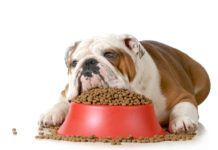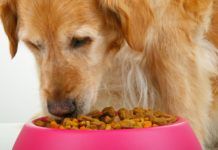A disease actually caused by a spike in dietary fat
One illness that does not cause elevations in blood fats but, rather, can be caused by eating too much fat is pancreatitis. Thats a disease in which pancreatic enzymes meant to break down nutrients like fats and carbohydrates spin out of control and actually start digesting the cells of the pancreas itself. Symptoms range from loss of appetite and unremitting episodes of vomiting and diarrhea to fever and acute pain around the abdomen. These may be complicated by dehydration, jaundice, kidney problems, and, in rare cases, the death of pancreatic cells that can prove fatal for the animal. Eating a lot of fat, say, from table scraps at holiday time is one of the most common causes of pancreatitis in dogs. Its not known if its the total amount of fat or the drastic change in the diet that increases the risk, but its definitely best to avoid quick changes in diet, especially when the changes include adding a high amount of fat.
The Three Most Common Supplements for Older Dogs
Theres no reason for a healthy dog, even for a healthy older dog, to take supplements. Dog food with a label that says it has undergone feeding trials by AAFCO (Association of American Feed Control Officials) or has been formulated according to AAFCO standards truly contains everything your pet needs to maintain good health. That said, dog supplements comprise a big industry, in all probability accounting for at least $1 or $2 billion of the $60 billion Americans spend each year on their pets. The three most popular for our geriatric canine companions are antioxidants, glucosamine, and omega-3 fatty acids. Is there ever a reason to administer any of these to your aging pal?
Big Dog, Little Dog
Dogs on the small side are thought to be the ones who tend to have adverse reactions to leptospirosis vaccinations, but at Tufts, says clinician Mary Labato, DVM, DACVIM, we recommend lepto vaccination for all dogs, not just medium and large dogs. In fact, she says, 50 percent of dogs treated for leptospirosis at Tufts weigh less than 25 pounds. And a Michigan study reported that while almost 25 percent of more than 1,200 dogs examined had tested positive for lepto bacteria, terrier and toy breeds in that group tested positive about 30 percent of the time. That was a higher percentage than large breed and hunting dogs, Dr. Labato says.
How Worried Should You Be About Foodborne Illness?
Every so often, media reports of potential problems with pet foods prompt dog owners to worry about the safety of their pets food and go scrambling for more information, typically on the Internet. Generally speaking, just how concerned should you be?
Diet for Dogs with Heart Disease
As the heart disease becomes more severe, you will want to speak with your dogs veterinarian about dropping to 80 milligrams of sodium per 100 calories of food, or even 50. Over-the-counter options are not as plentiful at that level, but they are certainly out there. You dont have to start cooking up the dogs meals at your stove.
Hidden Sodium
While its not difficult to find a dog food thats moderate, or low, in salt, what dog owners often dont realize is that there can be a lot of sodium hidden in people foods routinely given to pets, especially to administer the heart disease medications meant to ameliorate the effects of the disease. Among those high-sodium foods: cheese, deli meats, peanut butter, and even bread, Dr. Linder says. If you want to use peanut butter, she advises, make sure to get a no-salt-added brand. Table scraps are often high in sodium, too - everything from ketchup to potato and rice mixes to soups. Even licking the bowl can add a lot of sodium to a dogs diet.
Will Keeping a Dogs Weight Ideal Help?
Dog owners find that overweight dogs with heart disease who are trimmed down with a sound weight management plan appear to have less trouble getting around and are more comfortable breathing - no surprise there.
Trimming Down Your Overweight Dog
Kim and Dave Rossi couldnt figure out what they were doing wrong. Their two chocolate Labs, Buster and Dutch, kept gaining weight no matter how much they cut back on the dogs food. The couple was particularly confused because they had chosen the food very carefully, paying attention to marketing claims that it was high quality and also giving the dogs powdered supplements to add to their nutrition. The one thing we didnt know, Mrs. Rossi says, was the calorie content of what we were feeding them.
Feeding the Dog with Liver Disease
A lot of owners want to change their dogs diet if they see any signs that somethings not right with the liver, says Tufts veterinary nutritionist Cailin Heinze, VMD, DACVM. But a change in liver enzyme values on blood work does not necessarily mean that a dietary change is appropriate. Indeed, there are only two main instances where dietary change has been shown to be beneficial for liver disease. One - When the liver disease is severe and the dog has protein intolerance; and two - when there is excess copper in the liver.
Does Your Dog Eat Too Fast?
People are often told to eat slowly, both so that they dont get indigestion and also because its simply whats done in polite company. Dogs - you can tell them to eat slowly all you want. But for many, that advice will go about as far as reminding your pet that the fork goes on the left.
What to Feed Your Pregnant or Lactating Dog
The Tufts study suggests that many of the breeders feeding their pregnant dogs incorrectly may have been paying more attention to specific diet ingredients and other diet factors rather than to the information on the package in fine print that lets a dog owner know whether a food is right for an expectant dog or one who has recently given birth and is still letting her litter suckle.
Take-Home Points
If the diet has been formulated to meet nutrient requirements, it should say for all life stages or for growth in order to be suitable for feeding pregnant or lactating bitches.











